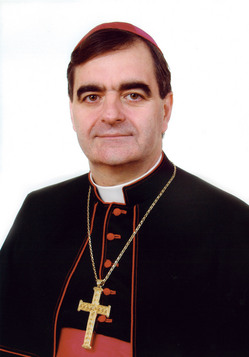Sacred Scripture: July 2009 Archives

His Excellency, the Most Reverend Nikola Eterovic, Secretary General of the Synod of Bishops, Vatican City State, will deliver a talk titled "Pope Benedict XVI, the Bible and the Synod of Bishops."
The archbishop will review the seminal work of the of the world-wide gathering of bishops and other experts on the Word of God which happened in October 2008.
The talk is sponsored by the American Bible Society and is being presented at their NY Offices.
Details:
Date: Tuesday, July 28, 2009
Time: 6:30-7:30 p.m.
Location: The American Bible Society
1865 Broadway (between 61st & 62nd Streets) New York, NY 10023
RSVP Alicia DeFrange at 212-408-1260 or by emai adefrange@americanbible.org
How often do you hear that Catholics don't read the bible? How often do you think (or say) that you aren't a bible thumper? Do you know bible basics? Do you have a bible in your home? Do you know where to find a bible in your Catholic church? I'd be willing to bet that you can't even find a copy of the bible in the church. Just today a college student asked me if there was a bible in the church and I had to admit that I wasn't sure if we had one available. Ironically, today began the parish's Vacation Bible School with a 140 little kids so the question of how we use the bible is in the forefront of our minds. Mary Elizabeth Sperry compiled a Catholic's approach to the bible-praying-reading-study-meditation.
The Bible is all around us. People hear Scripture readings in church. We have Good Samaritan (Luke 10) laws, welcome home the Prodigal Son (Luke 15), and look for the Promised Land (Exodus 3, Hebrews 11). Some biblical passages have become popular maxims, such as "Do unto others as you would have them do unto you (Matthew 7:12)," "Thou shalt not steal (Exodus 20:15), and "love thy neighbor" (Matthew 22:39).
Today's Catholic is called to take an intelligent, spiritual approach to the bible.
Listed here are 10 points for fruitful Scripture reading.
- Bible reading is for Catholics. The Church encourages Catholics to make reading the Bible part of their daily prayer lives. Reading these inspired words, people grow deeper in their relationship with God and come to understand their place in the community God has called them to in himself.
- Prayer is the beginning and the end. Reading the Bible is not like reading a novel or a history book. It should begin with a prayer asking the Holy Spirit to open our hearts and minds to the Word of God. Scripture reading should end with a prayer that this Word will bear fruit in our lives, helping us to become holier and more faithful people.
- Get the whole story! When selecting a Bible, look for a Catholic edition. A Catholic edition will include the Church's complete list of sacred books along with introductions and notes for understanding the text. A Catholic edition will have an imprimatur notice on the back of the title page. An imprimatur indicates that the book is free of errors in Catholic doctrine.
- The Bible isn't a book. It's a library. The Bible is a collection of 73 books written over the course of many centuries. The books include royal history, prophecy, poetry, challenging letters to struggling new faith communities, and believers' accounts of the preaching and passion of Jesus. Knowing the genre of the book you are reading will help you understand the literary tools the author is using and the meaning the author is trying to convey.
- Know what the Bible is - and what it isn't. The Bible is the story of God's relationship with the people he has called to himself. It is not intended to be read as history text, a science book, or a political manifesto. In the Bible, God teaches us the truths that we need for the sake of our salvation.
- The sum is greater than the parts. Read the Bible in context. What happens before and after - even in other books - helps us to understand the true meaning of the text.
- The Old relates to the New. The Old Testament and the New Testament shed light on each other. While we read the Old Testament in light of the death and resurrection of Jesus, it has its own value as well. Together, these testaments help us to understand God's plan for human beings.
- You do not read alone. By reading and reflecting on Sacred Scripture, Catholics join those faithful men and women who have taken God's Word to heart and put it into practice in their lives. We read the Bible within the tradition of the Church to benefit from the holiness and wisdom of all the faithful.
- What is God saying to me? The Bible is not addressed only to long-dead people in a faraway land. It is addressed to each of us in our own unique situations. When we read, we need to understand what the text says and how the faithful have understood its meaning in the past. In light of this understanding, we then ask: What is God saying to me?
- Reading isn't enough. If Scripture remains just words on a page, our work is not done. We need to meditate on the message and put it into action in our lives. Only then can the word be "living and effective."(Hebrews 4:12).

